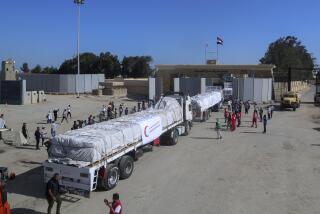Modern-Day Exodus
- Share via
The airlift was lightning fast, clocked like a military operation, but it was a mission of mercy, not warfare--a modern-day exodus, not an invasion, carrying an estimated 500 Falashas to their promised land, to a new beginning in Israel.
Americans fashioned the airlift, just as they had organized the earlier Operation Moses that carried 7,800 Falashas from Sudan to Israel at the end of last year and in the first days of this year. But much credit must go to President Jaafar Numeiri of Sudan, who sanctioned the two operations despite threats from militant Muslims. Numeiri himself had articulated his dilemma, for he had to weigh compassion against the politics of the Middle East. He made clear that he, a faithful Muslim, had no wish to be seen as someone helping Israel by sending more to populate an “enemy” land.
The latest chapter in the rescue operation was reported by our correspondent, Charles T. Powers, from Gedaref, in southeast Sudan, temporary home for thousands of refugees from civil war and drought in Ethiopia. For most of the refugees there is no prospect of a fresh start. But Israel was willing to open its doors to the Falashas and to help fund Operation Moses. That is consistent with the Falasha claim to be black Jews, tracing their lineage to those who accompanied Menelik, son of King Solomon and the Queen of Sheba, when Menelik left Jerusalem to return to Africa. That claim of Jewishness has stirred some controversy; the Falashas are resisting a call from Israel’s chief rabbi that they submit to symbolic conversion rites, including immersion and circumcision.
There is no answer, in these extraordinary rescue operations, to the terrible problems that still beset Africa. This escape does not resolve the persecution of minorities in Ethiopia, an abuse that unleashed the painful flight of the Falashas even before the ravages of the drought left them no alternative. It does not end the civil strife that besets so many nations caught in the drought, Sudan among them. It does not minister to others driven to refugee camps or forced into internal relocations--victims of natural disasters, failures of governments, warfare or combinations of all these factors. There may be as many as 3 million homeless in Africa even as these fortunate 8,300 have been flown out of their camps to Israel.
There can be satisfaction, nevertheless, that the misery of a few, if not of the many, has been addressed, that some have been spared, and have found new hope.
More to Read
Sign up for Essential California
The most important California stories and recommendations in your inbox every morning.
You may occasionally receive promotional content from the Los Angeles Times.










